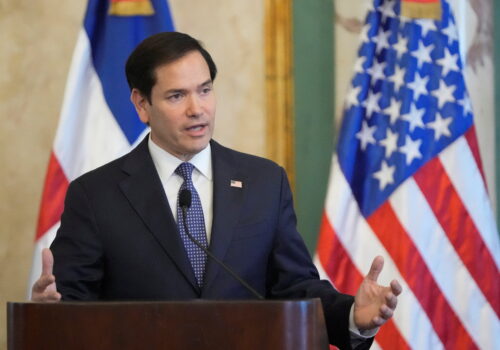US interests can benefit from stronger congressional ties with the Caribbean
Toplines
- The Caribbean’s geographic proximity to the United States—as well as its use as a transit point for US citizens, goods, and financial services—makes it a crucial hub for US national interests. However, the relationship has suffered from inconsistent and infrequent assistance. Changes in US policy priorities bring ever-changing adjustments to US engagement, leaving the Caribbean, its leadership, and its institutions with insufficient time to benefit from US policy action.
- For Caribbean countries, policy continuity is critical for implementation and to see tangible and meaningful development. The region’s small populations and markets, vulnerability to natural disasters and changing global commodity prices, and limited institutional capacity slow the pace of receiving and utilizing development assistance and support.
- Underpinning US-Caribbean ties with stronger US congressional engagement can provide needed longevity to the relationship. Congressional actions—like newly appropriated resources and committee hearings—can bring tangible benefits to US-Caribbean relations.
Where should the US Congress put its attention?
The heterogenous nature of the Caribbean offers various opportunities to strengthen relations with the region and, by extension, advance US interests. From natural gas to geothermal energy, Caribbean countries offer new opportunities for US investment. Reducing crime and gang proliferation across the region can protect US citizens traveling abroad and stem the potential flow of illicit goods and services.
Energy security
The United States can strengthen its positioning in the Caribbean by supporting regional energy security. At current estimated reserves, Guyana, Suriname, and Trinidad and Tobago house almost 30 trillion cubic feet of natural gas, with further offshore exploration expected to increase the size of reserves. At the same time, other countries require reliable power generation–which can be provided by liquified natural gas (LNG) imports–to provide resilience to their electricity grids during natural disasters, improve economic competitiveness, and to underpin ambitions to add renewables to their energy matrix.
Here, the United States will find opportunities on three fronts. First, natural gas exploration opportunities, liquefaction infrastructure, and building pipelines and LNG storage are areas where US oil and gas companies and mid-size service-based companies can invest. Second, imported oil from Guyana, Suriname, and Trinidad and Tobago can be low-cost and competitive options vis a vis other suppliers to satisfy growing US energy demand and supplement domestic shale supply in Texas and Midwestern states. Finally, congressional members can work with the Southern Caribbean hydrocarbon producers to support energy security in Europe and lessen demand for Russian energy resources by increasing cargo exports to EU members.
Greater Caribbean energy security can also lead to lower electricity prices, which can benefit constituents of US congressional members traveling to the Caribbean and potentially reduce migration to the United States. Most of the region (except for Suriname and Trinidad and Tobago) pays some of the highest electricity in the Americas (see Figure 3), which is on average, double or triple what US consumers pay. At the same time, electricity costs can account for almost 70 percent of a hotel’s utility due to air conditioning, lighting, and heating, among others.
Therefore, to keep profits stable, the high costs translate to the consumer–in this case, US tourists. This means that by bringing down electricity costs and lowering the cost to travel and having overnight stays in the Caribbean, US tourists benefit and have more purchasing power to buy in-country goods (most of which are imported from the United States). Further, reducing electricity prices can stem Caribbean emigration flows to US shores given that high costs of living are a key migratory push factor.
Reducing violent crime and gang activity
Security concerns in the Caribbean are on the rise. Figure 4 shows that Caribbean countries have high homicide rates (per 100,000) relative to their Latin American neighbors. Rates have been on the rise due to increased gang proliferation and illegal imports of small arms–many of which originate from the United States. For example, countries like Trinidad and Tobago, declared a state of emergency late 2024 due to increased gang activity and the usage of high-powered assault weapons. Gang proliferation is also on the rise. While Caribbean countries do not house large gangs, smaller gangs pervade the region, using the informal ports of entry to move illicit guns, goods, and services. In 2021, Jamaica identified 379 different gangs with 140 named in 2023 for Trinidad and Tobago. The decentralized nature of criminal and gang networks in the region inhibits Caribbean governments and police forces’ abilities to combat gang operations. Further, gangs in the Caribbean, especially in Jamaica, are turf oriented. This allows smaller gangs to gain a foothold in local communities, sometimes acting as community leaders and providing needed social services and protection from rival gangs.
Addressing the Caribbean’s security challenges can protect US citizens traveling to the region and curb gang activity and illicit trafficking before they reach US shores. Travel destinations for US citizens, such as Jamaica and islands in the Eastern Caribbean are among the most violent in the region. Therefore, improving citizen safety in the Caribbean ensures US citizens’ safety as well. Given that gun-related activities are a primary driver of citizen insecurity, one solution is for US agencies to work closer with Caribbean defense and police forces to improve monitoring, tracking, and seizures of illegal small arms.
Further, stemming gang activity in the region can also disrupt transnational criminal organizations’ operations. Specifically, Caribbean countries are used as a transit point for drugs, many of which end up in the United States. Enhanced maritime security and interdiction in the Caribbean Sea can help interrupt illegal drug supply chains and weaken transnational criminal organizations. However, the capacity to monitor drug flows is a challenge. Partnerships with the United States to gain access to satellite imagery and drone technologies to identify drug shipment routes can provide Caribbean governments the needed tools to tackle drug flows.
Bottom lines
- The challenges facing Caribbean countries are growing and have consequences that are not constrained to the region’s geographic borders, likely to directly or indirectly affect US interests. This can be avoided if there are consistent and strong partnerships between the Caribbean and the United States. This can and should start with stronger US congressional engagement to the region.
- US congressional members should consider legislation that prioritizes a holistic strategy with appropriated resources to the Caribbean. While CBSI tackles security challenges, support is needed across the energy, infrastructure development, agricultural, and financial services, among others.
- Given the importance of the Caribbean to US interests, the House Foreign Affairs Committee should consider a hearing that highlights new opportunities to strengthen US interests in the Caribbean and the broader US-Caribbean partnership.
- Strengthening US-Caribbean ties start with building a foundation for a long-term partnership. US congressional engagement can help turn four-year policies into decades of friendship, all while protecting US interests along its “third border.”
Read the full issue brief
About the authors
Related content
Explore the program

The Adrienne Arsht Latin America Center broadens understanding of regional transformations and delivers constructive, results-oriented solutions to inform how the public and private sectors can advance hemispheric prosperity.




